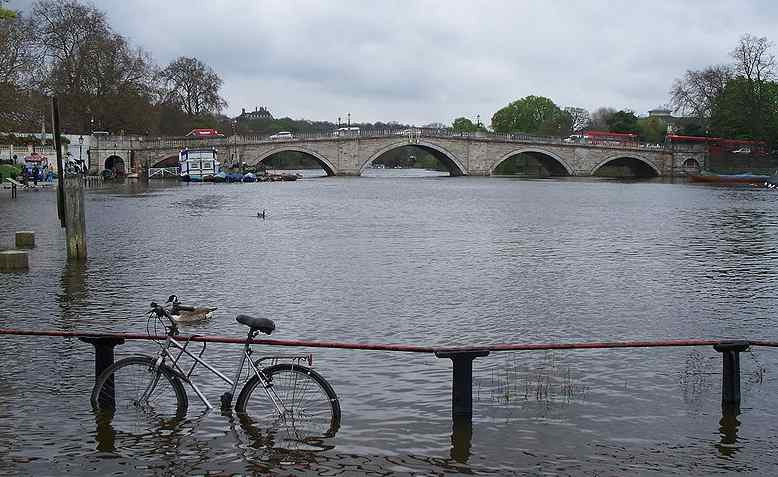 Flooding in Richmond, Photo: Iridescent / Wikimedia Commons / cropped from original / licensed under CC BY-SA 3.0, linked at bottom of article
Flooding in Richmond, Photo: Iridescent / Wikimedia Commons / cropped from original / licensed under CC BY-SA 3.0, linked at bottom of article
The extreme weather experienced across the globe recently is a direct result of a climate crisis caused by the capitalist mode of production and activists must pressure world leaders to act, writes Nathan Street
If you ever wanted a headline to exemplify the contradictory features of the climate crisis you need to look no further than “Siberian wildfires burn over 1.5 million hectares of forest as smoke and heatwave choke ‘world’s coldest city”. Whilst not the most populous or romanticised corner of the globe, which might add to the sense that the story is underreported in the media, the Siberian wildfires are becoming a near annual event. The air quality in the 300,000+ populace city of Yakutsk has been so bad at times it has been in the category of ‘airpocalypse’ – an estimated 17 times worse than the average of the most polluted cities of India and China.
Meanwhile, another element is causing devastation, namely water in the form of floods. Whilst many Londoners will be surprised by the scale of the floods there on Sunday, they pale in comparison to those seen across parts of Europe. This disaster has featured most prominently in the Ahrweilerin and North Rhine-Westphalia regions of Germany and Wallonia in Belgium. 217 people have died at the time of writing, with many more still missing. The disruption has been immense, with communities cut off, infrastructure destroyed and homes lost.
As one local opined, “You don’t expect people to die in a flood in Germany. You expect it maybe in poor countries but you don’t expect here.” Perhaps people with this pattern of thinking would argue that floods similar to those in the village of Taliye near Mumbai, which has left at least 110 people dead, are more ‘expected’.
Whereas the UK experienced a heatwave of a kind last week, it was only a few weeks ago that the world witnessed the killer heatwave across the West coast of Canada and the US. It is a safe bet to think there will be further severe heatwaves this summer.
Whilst clearly there are increasing likelihoods of particular extreme weather events occurring in certain localities around the world or at particular times of the year, events like the Canadian heatwave or the floods in Germany are shocking climate scientists in terms of how rapidly they are occurring. It shows that nowhere is truly safe from everything.
This is all happening on 1.2 degrees of warming. Current trends, however, show the planet to be on target for an exponentially more catastrophic temperature rise of 3 to 5 degrees. These ‘natural’ disasters are not really so natural – both in the base cause of the capitalist mode of production increasing their regularity and extent, and in the mitigation of the worse effects when they do strike. They are the product of an economic system in which the profit motive takes priority over bringing about the kind of change needed to prevent catastrophe. When push comes to shove, liberal and conservative political figures are ultimately loyal to the economic status quo. There is little political will or know-how to intervene in the corporate activity that drives climate change. When these problems have been known about for decades, yet only bit-part measures have been adopted to partially reduce carbon emissions, what other conclusion can be made but that capitalist governments cannot properly alter course to deal with the scale of the crisis?
There are undoubtedly tangible actions that could better address some of the worse effects of these weather events. For example, there was particular criticism in Germany for delayed warning and inadequate flood defence systems. Socialists need to demand these sorts of reforms as an immediate step and relate to the practical solutions as they find them. More funding for wildfire and flood protection infrastructure should be insisted upon as a start.
But we also need to recognise that underfunded protection systems and shocking weather events will be repeated and get even worse unless we start to overturn some of the fundamentals of the capitalist system. To do that, we need to argue for a situation where people can make decisions in their workplaces and communities about the issues that the concern them. These will invariably relate to sustainability and security in favour of people and planet, not the corporations driving the climate and ecological crisis.
There may be some who think there is silver lining to the recent extreme weather events. That since the countries suffering from these disasters are some of the most powerful and important ones e.g. the US, China, India, Germany, Russia and Canada, this may spur them into necessary multilateral action, particularly with the COP26 taking place in less than a hundred days in Glasgow.
Previous experience of climate change conferences would suggest a different expectation, unless these governments are put under mass pressure. It is thus imperative we have a strong socialist voice amongst the protests, urging for stronger action. With the world watching, activists in the UK have an opportunity to build the largest demonstrations and actions that can reinforce pressure on world leaders to act. COP26 is an opportunity to raise our arguments very forcefully – that climate change is not a problem caused by individual consumers but a systemic one.
Join Revolution! May Day weekender in London
The world is changing fast. From tariffs and trade wars to the continuing genocide in Gaza to Starmer’s austerity 2.0.
Revolution! on Saturday 3 – Sunday 4 May brings together leading activists and authors to discuss the key questions of the moment and chart a strategy for the left.

